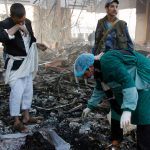The Saudi- and Emirati-led coalition marked the four-year anniversary of its intervention in Yemen this week by bombing yet another hospital on Tuesday, March 26. A missile landed within 50 meters of Kitaf hospital, which is located in a densely populated area of northwest Yemen and is supported by the international organization Save the Children.
The attack killed eight people, including five children, a health worker, and a security guard. It also injured at least eight other people. Helle Thorning-Schmidt, the chief executive of Save the Children International, expressed her dismay given that the attack occurred during the hospital’s busy morning and that the facility’s coordinates had been shared with the Saudi-Emirati-led coalition and therefore should have been explicitly avoided.
Aerial bombardment has been one of the defining features of the Yemen conflict. These assaults have devastated the country’s infrastructure, destroying hospitals, medical centers, aid stations, residential areas, highways, schools, and places of worship. By one estimate, the Saudi- and Emirati-led coalition has conducted over 8,600 air raids, and 31 percent of all targets hit were non-military. The obvious impact of the air raids on the civilian population highlights the disregard by the coalition for international laws concerning the basic rules of war, which exist to protect innocent civilians.
The United Nations Group of Eminent Experts on Yemen 2018 report on the practices of the Saudi-Emirati-led coalition points to its failure to abide by the laws of war, including the principle of distinction (distinguishing between civilian and military targets). Although the coalition has access to no-strike lists and the technical capacity to precisely target its strikes, the UN’s findings call into question the coalition’s willingness to engage in war in accordance with international humanitarian law and raise the grave concern that these attacks on civilians are deliberate in nature.
Physicians for Human Rights (PHR) has been documenting the targeting of health care facilities and the failure of all warring parties to take appropriate measures to shield these facilities from attacks. Over the past year, PHR has independently confirmed more than 23 individual attacks on health facilities. With about 50 percent of hospitals and health facilities in Yemen out of service or functioning partially, each new attack on a functioning facility has a magnified effect on a population whose medical needs have sharply increased since the beginning of the conflict. These attacks, the blocking of humanitarian aid, and the use of starvation as a weapon of war violate medical neutrality and international humanitarian law. These acts constitute war crimes and may amount to crimes against humanity, given their widespread and systematic nature.
Yemen faces the most severe humanitarian catastrophe in the world today, and its medical sector is reeling from the increasing number of conflict causalities, coupled with reduced capacity due to the shortage of medical supplies and the pervasiveness of disease such as cholera. PHR calls on the Saudi-Emirati-led coalition to respect the no-strike lists and to respect hospitals and medical facilities in line with obligations under international humanitarian law and the laws of armed conflict. We further call on all parties to the conflict to immediately cease acts of violence against civilian persons and objects, and to take all possible measures to protect these from the impact of hostilities. All warring parties in Yemen must acknowledge their responsibility for the current crisis and work toward ensuring compliance with international norms.
Photo: Yemen rescue workers search for body parts amid the rubble of a destroyed funeral hall in Sanaa, Yemen in 2016. Mohammed Huwais/AFP/Getty Images

